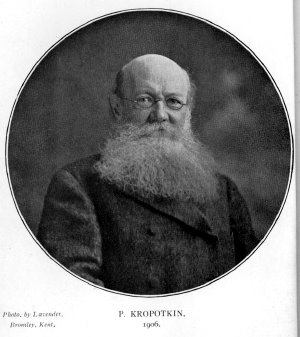Prince Peter Alekseyevich Kropotkin (1842-1921)
 "As is well known, throughout the whole of the nineteen centuries that elapsed after the first appearance of the Christian teaching, military predatoriness never ceased to be extolled as the highest virtue. To our own time Alexander the Great, Karl, Peter I., Frederick II., Napolean, are regarded as heroes. And yet, in the Indian “Mahabharata,” especially in the second part, a very different course of conduct was advocated:
"As is well known, throughout the whole of the nineteen centuries that elapsed after the first appearance of the Christian teaching, military predatoriness never ceased to be extolled as the highest virtue. To our own time Alexander the Great, Karl, Peter I., Frederick II., Napolean, are regarded as heroes. And yet, in the Indian “Mahabharata,” especially in the second part, a very different course of conduct was advocated:“Treat others as thou would’st theyself be treated.
Do nothing to thy neighbor, which hereafter
Thou would’st not have thy neighbour do to thee.
A man obtains a urle of action by looking on his neighbour as himself.”
The Chinese thinker, Lao Tze, also taught that “peace is the highest aim.” Persian thinkers and the Hebrew book of Leviticus taught these things long before the appearance of Buddhism and Christianity…. These facts, as well as the numerous instances that I pointed out in my “Mutual Aid” in connection with the savages and mankind during the so-called “barbarian,” i.e., during the “tribal” period, and the multitude of facts that are contained in the existing works on anthropology,—all these are fully established. They show that while, during the founding of new states or in states already existing, the ethics of plunder, violence, and slavery was in high esteem among the ruling classes, there existed among the popular masses from the time of the most primitive savages, another ethics: the ethics of equity, and, consequently, of mutual benevolence."
~Peter Alekseyevich Kropotkin, Ethics: Origin and Development (New York: Tudor, 1947), 310-311.




0 Comments:
Post a Comment
<< Home